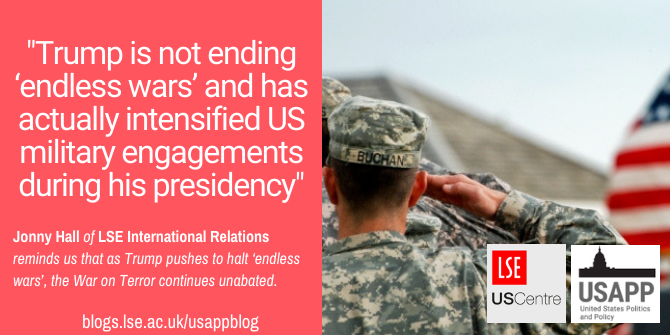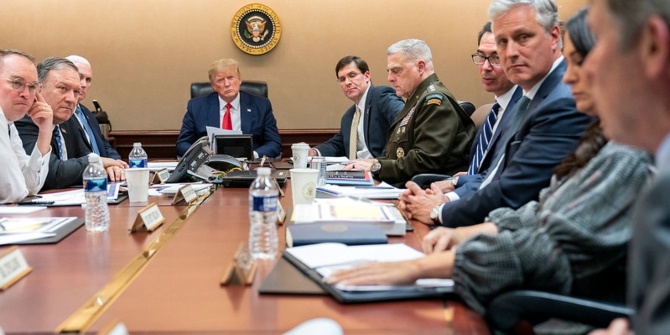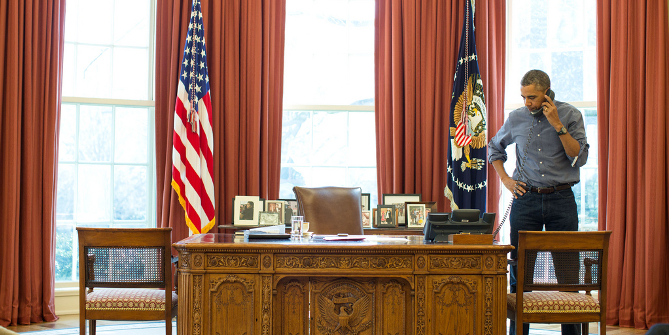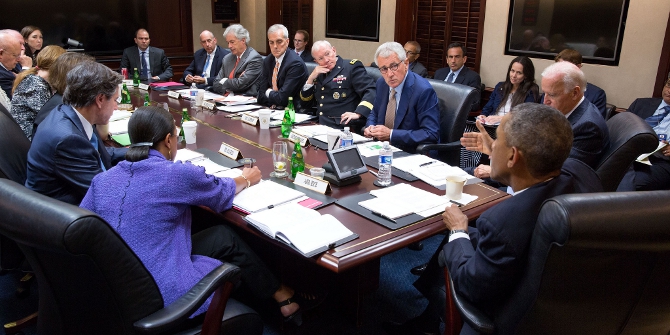 Several weeks ago, President Trump announced that US forces in north-eastern Syria would be withdrawn, citing one factor behind the move as being part of his continued rejection of the ‘endless wars’ the US has been engaged in since the end of the Cold War. Jonny Hall writes that Trump has largely moved away from military involvement in words only; his administration’s counterterrorism policies are actually very similar to those of his predecessor, President Obama.
Several weeks ago, President Trump announced that US forces in north-eastern Syria would be withdrawn, citing one factor behind the move as being part of his continued rejection of the ‘endless wars’ the US has been engaged in since the end of the Cold War. Jonny Hall writes that Trump has largely moved away from military involvement in words only; his administration’s counterterrorism policies are actually very similar to those of his predecessor, President Obama.
Somewhat expectedly, much has been made of Donald Trump’s mid-October decision to withdraw American troops from north-eastern Syria, effectively green-lighting a Turkish attack on the Kurdish-led Syrian Democratic Forces. Unlike many other acts of the Trump presidency, his withdrawal order has even managed to create a degree of bipartisan criticism, with Republican senators and congresspeople speaking out against the move. Trump’s defence against these critical voices – aside from his proclaimed ‘different take’ that the Kurds shouldn’t be assisted because they had not fought with US forces in World War II – has primarily taken two forms: to argue that Turkey would be punished for any improper behaviour (which remains to be seen), and to decry this conflict as part of the ‘endless wars’ that the US has unnecessarily become entangled in during the post-Cold War period.
Trump’s use of the phrase is can tell us several things about the current state of US counterterrorism campaigns. To begin with, it suggests that Trump believes this to be a politically appealing term. It is not hard to identify the natural links between an ‘America First’ foreign policy and the policy of withdrawal; as one tweet by the president put it:
https://twitter.com/realDonaldTrump/status/1181172465772482563
The idea of only deploying US troops to serve a self-benefiting cause clearly aligns with Trump’s depiction of a zero-sum world where the US has been ‘losing’ at the expense of both allies and foes. Furthermore, one recent Rasmussen poll found that 58 percent of those polled agreed with Trump’s tweet when it was presented anonymously, with only 20 percent disagreeing.
Trump’s use of the term effectively aligns himself with a fairly eclectic collection of voices against what has also become known as the ‘forever wars’. For example, in June this year the respectively right and left leaning philanthropists Charles Koch and George Soros joined together to finance the Quincy Institute for Responsible Statecraft, which in large part devotes itself to condemning these ongoing conflicts. Albeit focused specifically on US involvement in Afghanistan, Concerned Veterans for America recently launched an ‘End Endless Wars’ campaign, which presidential candidate Andrew Yang publicly supported in the third Democratic debate.
More broadly, almost all the Democratic candidates who responded to FiveThirtyEight’s foreign policy questionnaire said that they would a) have all US troops out of Afghanistan by the end of their first term as President, b) end US military involvement in Yemen, and c) repeal the 2001 Authorization for the Use of Military Force. And yet, only one prominent proponent of the ‘endless wars’ perspective – Senator Rand Paul – explicitly voiced his support for Trump’s decision, tweeting that the president was fulfilling ‘his promises to stop our endless wars and have a true America First foreign policy.’
Thus, we are faced with a paradoxical situation, where a growing anti-war movement has failed to support Trump despite him using the language of ‘endless wars’, and where there exists a rare degree of bipartisan consensus at odds with the general feelings of US public opinion. This can partly be explained by considering the deep-seated elite perceptions of what American foreign policy should do; as a result, it is not actually very easy to oppose the withdrawal of American troops in practice, as the Vietnam War taught us.
This is more apparent given the specifics of this case, where we have (again) seen the clear abandonment of the Kurdish cause that fought in alliance with US forces against the Islamic State. As such, it is not obvious as to whether this case is really part of the ‘endless wars’ that the US has been involved in since 2001 and Trump has begun to publicly decry. One commentator touched upon both of these issues: ‘What if I desperately wish to end our endless wars but I also care about the fate of Kurdish and other Syrian civilians?’

“Departure Ceremony” by The U.S. Army is licensed under CC BY 2.0
Furthermore, there is the broader objection that has been made by Stephen Wertheim of the aforementioned Quincy Institute: that Trump is not ending ‘endless wars’ and has actually intensified US military engagements during his presidency. In this sense, the events of the last month, and the reactions that the Trump administration’s policies have provoked, can be seen as a telling example of the peculiar political status of US counterterrorism campaigns. That is, Trump – whatever his personal motives for his set of decisions – clearly believes that there is a political market for opposing ‘endless wars’, hence the repeated use of the rhetorical trope.
And yet, not only was this decision criticised across the political spectrum, but as Wertheim and other commentators have argued, the Trump administration’s overseas counterterrorism strategy has been remarkably like his predecessor’s. How can we explain this disconnection? Trump’s tendencies to mislead and lie are part of the picture here, but there is also the broader issue of how these conflicts are now fought: they require nothing of American society, they have limited requirements of the American military (especially in terms of casualties), and they are not an easy political sell. Indeed, this is how Barack Obama was able to position himself as an anti-war president despite the geographical expansion of US counterterrorism campaigns during his presidency.
In this way, these counterterrorism campaigns have become almost a political football for Trump: the defeat of the Islamic State was a representation of the increased ‘toughness‘ of Trump’s approach, whilst his desire to withdraw is presented as the antithesis to the foreign policy establishment responsible for the original War on Terror (which largely continues unabated). Whether dissident voices such as the ones housed in the Quincy Institute can bring a genuine debate about the state of the ongoing US counterterrorism campaigns remains to be seen, but if Trump can successfully position himself as opposing ‘endless wars’, it will be a damning indictment for their chances.
Please read our comments policy before commenting
Note: This article gives the views of the author, and not the position of USApp– American Politics and Policy, nor of the London School of Economics.
Shortened URL for this post: http://bit.ly/2WttPMp
About the author
 Jonny Hall – LSE International Relations
Jonny Hall – LSE International Relations
Jonny Hall is a PhD Candidate in International Relations at the LSE. His research interests lie in American foreign policy, specifically counterterrorism Discourse in the Donald Trump era and the value of presidential rhetoric in this area in historical comparison.






